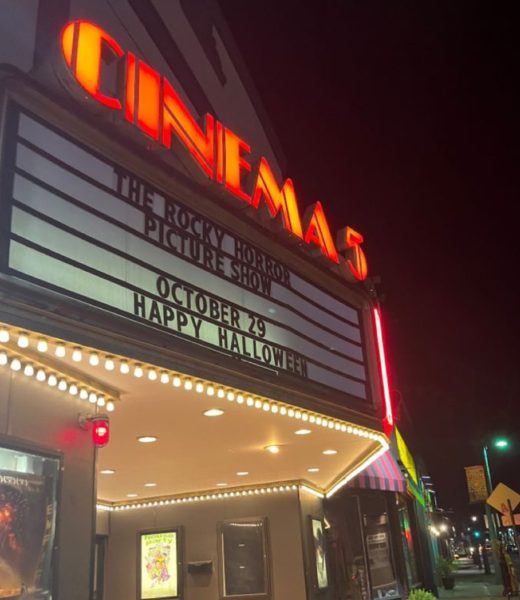Snackerphobic: Holly Thompson
Let me tell you a story:
A year or so ago I was slated for a presentation in school – write a paper, have several uncomfortable bowel movements before class, and read it aloud in your trembly 8th grade voice, etc. Plenty nervous and distracted on my own, I launched into the presentation, only to be derailed by a girl in the front row.
Listen – she was dead center in that row, wearing a hot pink shirt, impossible to miss. I was already practically addressing her, and suddenly out she pulled a bag of Hot Cheetos from her backpack.
She ripped open that little bag. I flinched.
She ate one Cheeto. I flinched again.
She ate another Cheeto. (All of this was done with her mouth hanging open, too.)
Let me tell you something. In that mass of wet Cheetos shifting in her open mouth, I saw all that was holy extinguished from the world. I am still recovering.
In general, teachers seem to waffle on their rules regarding eating in class. Most of them have that rule, or at least attempt to, but few actually enforce it. Why? (Granted, I’ve witnessed many a teacher in the public school system live the slow decline from their beginnings as a perky, scrubbed, “To Sir With Love” figure to the vaguely dead inside attitude of one who’s been wrangling adolescents for twenty years. But that’s another article.)
However, some of them have enforced this rule – no food and drink in the classroom. Curiously enough, none of my peers have truly seemed to suffer from this.
Why, then, do we cling so closely to the notion that it is our innate human right to have an unending supply of Mountain Dew in the right hand and Doritos in the left?
People get awful personal about their eating habits, but as we’ve progressed from the shame associated with weight and caloric intake, we’ve possibly gotten a little too comfortable with food. The Jennifer Lawrences of this world, with their endlessly charming personalities and their affinity for pizza, have managed to convince us correctly that weight is inconsequential and incorrectly that food is, too. If your body is a machine (and mine certainly is), then food is the oil. Too much oil and that machine begins to leak and smell funny. Real funny.
I suspect a decent portion of this entitlement indeed stems back to the name our middle aged predecessors have so lovingly given us: The Entitlement Generation. I’ve never been one for sweeping generalizations, but the truth must be faced – in general, America is a “gimme” country. More clothes, more games, more money, more candy, more more more. Abolish all need for streetlights anymore – there are enough fast food joints on every road to illuminate your path all night.
This conviction that we deserve what we want when we want has led us to sit down to a desk and immediately burst into that sweet bag of Cheetos. We crunch those Cheetos with such need that the voice of our teacher is lost in a spiritual haze. Our eyes glaze over. Those Cheetos are all that matter. The ache of a finished bag is palpable but forgotten with the second helping we so fortunately bought. The memory is preserved in the orange finger prints left on our exams.
I have a word for you: Discipline.
You don’t need those Cheetos. You especially don’t need them in the middle of class. It may be difficult to realize how little you need them until you’re standing at the front of a room, trying to instruct souls long-since consumed by preservatives and cheese fuzz, but you don’t need them.
The truth here is that you have ten minutes between every class to bounce downstairs and wrestle with the vending machine for the fantastically healthy snack the 2014-2015 school year has seen the rise of. You have the option, then, of eating this snack on one of many designated seats or floors our esteemed institution has to offer. Do so. Eat that snack with the conviction of a lion tearing into its prey.
And then begin to wean yourself. Realize that you are an animal, a finely tuned, calorie-loaded creature that doesn’t need that snack. You were designed to face the jungle school day on the energy of the healthy breakfast you should have eaten and the healthy lunch you will be so graciously provided with.
You’re an athlete? Congratulations, you’re an exception. You struggle with blood sugar? You are too. In presenting my pro-discipline argument to many of my peers, these are the two groups of people they cite in the fight for the right to eat in class. Let’s be realistic, though – those of us with unusual food-related needs are just that: Unusual. That is not the majority of the student body, and, regardless, I will always push for educators to have the wherewithal to recognize the individualized needs of students with unfortunate health problems and create a plan to aid them in dealing with it throughout the class block. Perhaps they may be allowed to have a snack during roll call. Perhaps, if this causes a rift in the classroom, they may be allowed to step outside with the snack. Or perhaps they may ask to go to the bathroom and instead sit in a stall happily munching that granola bar and sticking it to The Man with a vengeance. (Let’s be realistic here – we’ve all done it.)
Regardless, you know if you have an unusual need or if you’re just so accustomed to a constant food intake that you simply don’t want to train your body otherwise. It is one’s own prerogative to damage themselves with endless sodium and sugar if they please, but an institution like a public high school is not obligated to facilitate it.
Try not snacking for a day. Or, if you’re just too hungry (and that’s perfectly alright!), opt for a filling breakfast, a designated class break to eat a healthy snack, and a filling lunch. Try avoiding complaints about those teachers that enforce discipline and attention in the classroom, too. Healthy vibes equals a healthy body.









